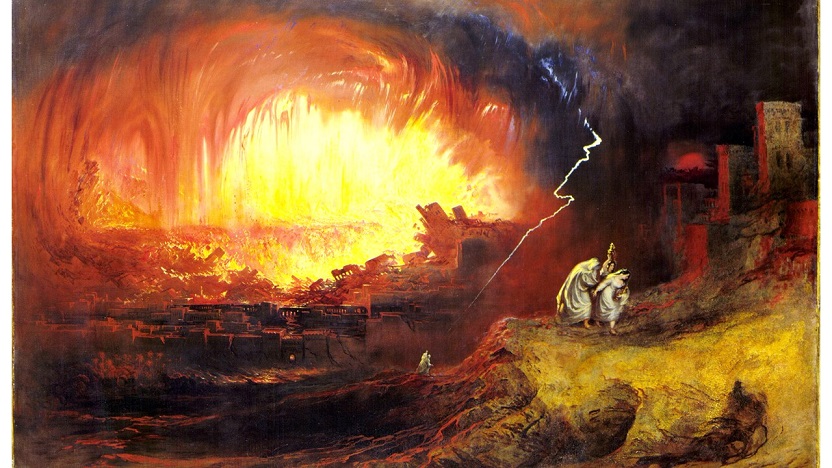.
For the Sake of Ten Thousand:
A Supplication from New Sodom
And Abraham came near and said, ‘Would You also destroy
the righteous with the wicked? Suppose there were fifty
righteous…?’” —Genesis 18: 23-24
Would you destroy the righteous with the savage?
Supposing fifty-thousand people who
Still worship You, and still have honest outrage
Live here—who hate these things the wicked do,
And love You, who have made them in Your image?
If forty thousand have the courage
To refuse to compromise
With vice, can we be saved from wreckage?
Will you stop destroyers’ lies?
Would you descend to salvage,
For thirty, our sick nation?
Save our civilization
From savagery
For twenty?
Or ten?
Oh when
Will You send down
Your ultimate salvation,
And make your truth and goodness known,
That we, your people, may rejoice again?
.
.
Cynthia Erlandson is a poet and fitness professional living in Michigan. Her third collection of poems, Foundations of the Cross and Other Bible Stories, was released in July, 2024 by Wipf and Stock Publishers. Her other collections are These Holy Mysteries and Notes on Time. Her poems have also appeared in First Things, Modern Age, The North American Anglican, The Orchards Poetry Review, The Book of Common Praise hymnal, The Catholic Poetry Room, and elsewhere.















This is a striking update, Cynthia, of the Biblical negotiation between Abraham and God. Bringing this story from Genesis into a contemporary setting puts a glaring spotlight on how truly depraved our society has become — a modern Sodom which spans the entire globe. A correspondingly larger number of good people is needed to justify the requested mercy and it is not at all clear that such numbers exist. Your poem goes well beyond Abraham’s request in profundity by praying not only for physical protection but for spiritual salvation — something which can only occur with the Second Coming. And with this addition your poem spans the entirety of the Bible, from Genesis to Revelation. It’s both moving and thought-provoking. Given the utter decimation of Western Culture, it’s hard not to ponder whether these are indeed the End Times.
Thank you so much, Brian.
Cynthia, I’m impressed with the easy-to-interpret structure of line lengths decreasing then increasing. Recalling Abraham’s dialogue with God, and its context, we can fill in the empty portions of lines, and determine that the speaker does not believe God will save our nation for 50,000 persons free of vice and savagery–because He does not find so many. He agrees with Abraham to save Sodom for ten (just 10, not 10,000), and it turns out there were only four (one of whom, Lot’s wife) perishes for not following instructions during the catastrophe.
Do we have 10,000–or whatever number God requires? Your speaker knows neither the number nor the answer, but the poem, by increasing line length, implies hope that “we your people may rejoice again.” I think this poem is about “our sick nation” and its particular civilization, not about end times for humanity as a whole–though that could be a proper reading behind my reading. We can recall that Lot persuaded God to spare a small town in the vicinity, though he ultimately found it was almost as bad as Sodom. Having learned his lesson, he left it (but there was still a test for him).
The “ultimate salvation” asked for in this poem is not the final apocalypse, but to make truth and goodness known again. This implies that we ourselves must continue to correspond to truth and goodness, in order to rejoice again. And perhaps acknowledge our sins and weakness, resolving on better lives for the future. We can remember as well that Lot and his daughters, and the nations descended from them, did not so correspond. Lot got drunk, and enabled his daughters to commit vile perversity similar to that of Sodom, which ended their “civilization.” Their descendants became enemies of God’s people.
Our nation must sober up and abandon the depravity it has “compromised” with, or God may designate another people to be His–as in the scriptural text behind this poem.
Thank you so much for your comments, Margaret. You are right that my idea for this poem came from focusing on the depraved condition our nation has been in for quite a long time.
Ingenious mimesis as the shortening number of lines per stanza and line length mirror the reduced number that God would accept to save Sodom. Masterfully done.
Thank you, James. I’m pleased that you noticed what I was trying to do with the lengths of the lines and stanzas that I used as the poem’s structure.
What a powerful poem! Your heartfelt words hold great weight in these times – an age when in-your-face-evil is on display every day, genuine care is at an all-time low, and indifference is rising. Cynthia, thank you!
I’m so glad you read it as powerful, Susan. Thank you!
Cynthia, this is beautifully done and is the perfect question from biblical antiquity we should be asking of God — and, yes, of our country. I relish how you creatively shortened each verse while reducing it per each ten thousand. I caught up to this later than usual, but felt the impact as intended.